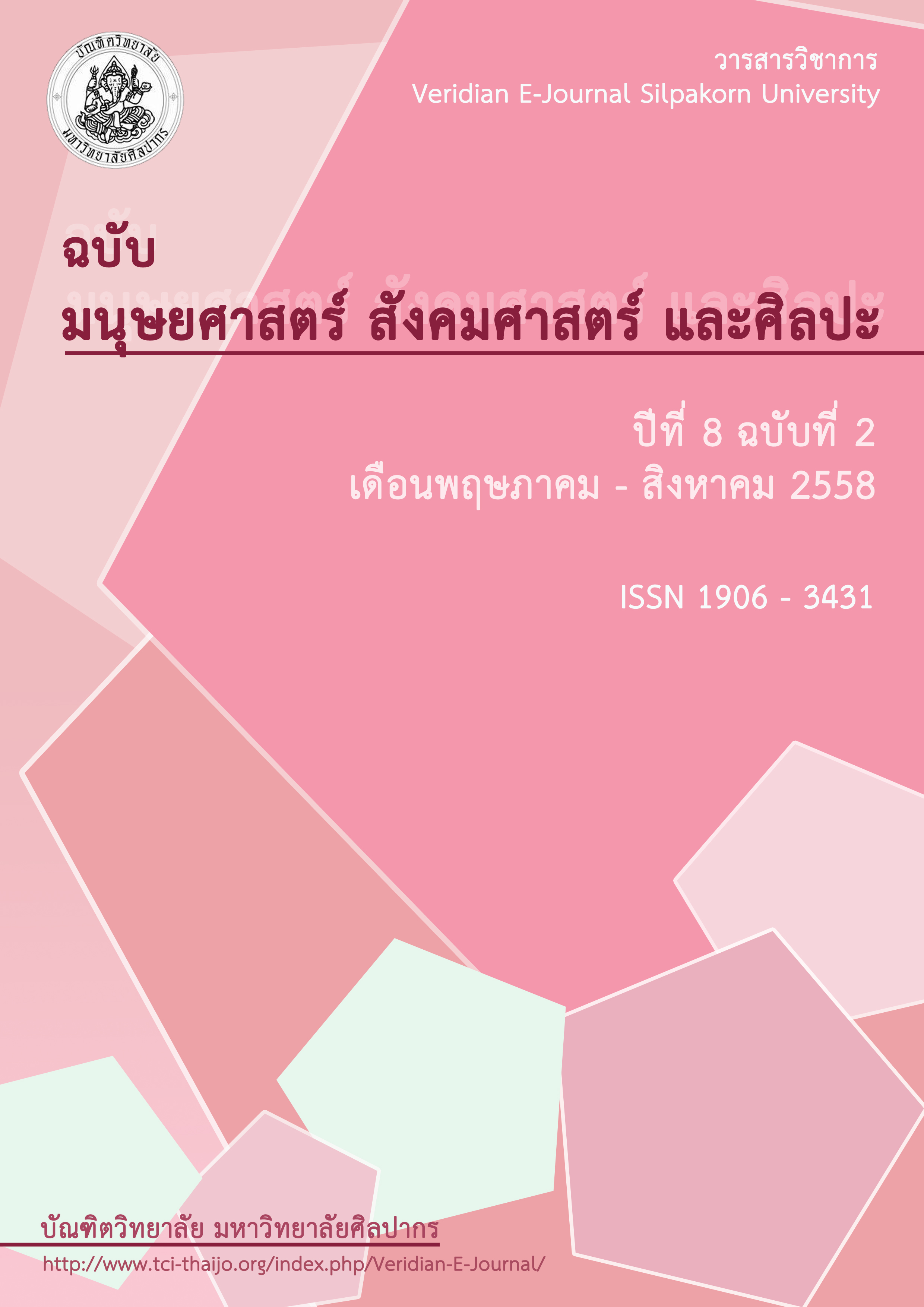อนาคตภาพของคุณลักษณะบัณฑิตวิชาชีพครู สาขานาฏศิลป์ไทย ในทศวรรษหน้า (พ.ศ. 2560 – 2569)
Main Article Content
Abstract
บทคัดย่อ
การวิจัยเรื่อง อนาคตภาพของคุณลักษณะบัณฑิตวิชาชีพครู สาขานาฏศิลป์ไทยในทศวรรษหน้า (พ.ศ. 2560 – 2569) มีวัตถุประสงค์เพื่อศึกษาคุณลักษณะของบัณฑิตวิชาชีพครู ด้านนาฏศิลป์ไทยที่พึงประสงค์ในอนาคต พ.ศ. 2560 – 2569) และกำหนดแนวทางที่เหมาะสม ในการพัฒนาคุณภาพบัณฑิตให้มีคุณลักษณะเป็นไปตามที่กำหนด โดยประยุกต์ใช้กระบวนการวิจัยอนาคตแบบชาติพันธุ์วรรณนา (EFR: Ethnographic Future Research) วิธีดำเนินการวิจัยแบ่งออกเป็น 3 ขั้นตอน คือ 1) การกำหนดกรอบคุณลักษณะของบัณฑิตวิชาชีพครู สาขานาฏศิลป์ไทย 2) ขั้นการวิเคราะห์ความสัมพันธ์ และองค์ประกอบคุณลักษณะบัณฑิตวิชาชีพครู สาขานาฏศิลป์ไทย และการร่างอนาคตภาพ 3) ขั้นการกำหนดแนวทางที่เหมาะสม ในการพัฒนาคุณภาพบัณฑิตวิชาชีพครู สาขานาฏศิลป์ไทยให้มีคุณลักษณะเป็นไปตามที่กำหนด
ผลการวิจัยพบว่า 1) คุณลักษณะของบัณฑิตวิชาชีพครู ด้านนาฏศิลปไทยที่พึงประสงค์ในอนาคต พ.ศ. 2560 – 2569) มี 9 ด้าน ได้แก่ คุณลักษณะด้านความรอบรู้ และทักษะทางปัญญา คุณลักษณะด้านคุณธรรม จริยธรรม คุณลักษณะด้านความรู้ เชิงวิชาการ และวิชาชีพ คุณลักษณะด้านความเป็นประชาธิปไตย คุณลักษณะด้านความสัมพันธ์ระหว่างบุคคล คุณลักษณะด้านการปรับตัวต่อการเปลี่ยนแปลง คุณลักษณะด้านการพัฒนาตนเอง คุณลักษณะด้านภาษา สื่อ และเทคโนโลยีสารสนเทศและคุณลักษณะด้านความเป็นไทย 2) แนวทางที่เหมาะสมในการพัฒนาคุณภาพบัณฑิตให้มีคุณลักษณะเป็นไปตามอนาคตภาพของคุณลักษณะที่ร่างขึ้น ประกอบด้วย (ก) การพัฒนาด้านหลักสูตรให้สามารถพัฒนาทักษะทางด้านวิชาการให้แก่ผู้เรียนเพิ่มมากขึ้น (ข)การพัฒนาด้านผู้สอนโดยผู้สอนต้องปรับแนวคิดและทัศนคติในการสอนให้เหมาะสมกับหลักสูตรของสถาบันฯ และพัฒนาตำรา และสื่อการเรียนการสอนให้มีประสิทธิภาพแก่การเรียนรู้ (ค) การพัฒนาด้านการเรียนการสอน โดยบูรณาการความรู้ทางด้านวิชาการและวิชาชีพเข้าด้วยกัน ใช้สื่อ เทคโนโลยีสารสนเทศ ประกอบการเรียนการสอนและสอดแทรกการเสริมสร้างคุณลักษณะด้านต่างๆ ให้แก่ผู้เรียน (ง) การพัฒนาด้านกิจกรรมนักศึกษา ควรเปิดโอกาสให้ผู้เรียนได้ดำเนินกิจกรรม โครงการ ต่างๆ ตามที่สนใจ ส่งเสริมการมีจิตสาธารณะและการเข้าร่วมกิจกรรมที่มีการทำงานร่วมกันระหว่างนักศึกษาหรือบุคคลภายนอกเพิ่มมากขึ้น และ (จ) การพัฒนาด้านการบริหารจัดการ โดยสถาบันต้องกำหนดมาตรฐานบัณฑิตให้เหมาะสมกับบริบทของสถาบัน มีระบบการคัดกรองการรับนักศึกษาในระบบปริญญาตรีให้มีประสิทธิภาพเพิ่มมากขึ้น และวางแผนงบประมาณในการสนับสนุนกิจกรรมโครงการของนักศึกษาเพิ่มมากขึ้น
คำสำคัญ: อนาคตภาพของคุณลักษณะบัณฑิตวิชาชีพครู, อนาคตภาพ, นาฏศิลป์ไทย
Abstract
The objectives of this research were to examine the characteristics of desirable teaching graduates on Thai Classical Dance in next decade (2017-2026) and to determine the quality development guidelines for these graduates. Based on the Ethnographic Future Research (EFR), the method consisted of 3 steps as follows: 1) initial data survey including literature reviews and face-to-face interviews with sixteen administrators and experts on vocational education management for Thai Classical Dance in Bunditpatanasilpa Institute;
2) exploring the relationships between the conceptual framework of determinate characteristics and empirical evidences: analyze by Exploratory Factor Analysis (EFA) and drafting scenario of the characteristics of teaching graduates on Thai Classical Dance; 3) formulating the appropriate guidelines on quality management for the graduates to achieve the desirable characteristics by applying EFR method.
The results of this research show that: 1) The desirable characteristics of teaching graduates on Thai Classical Dance in next decade include nine aspects as follows: intelligence, ethic and morale, academic and vocational knowledge, democratization, relationship, modernization, self-development, language and communication, information technology and Thainess; 2) The appropriate guidelines to achieve those characteristics consist of different developments; (a) Curriculum aims at developing more academic skills for students; (b) Teachers should adapt their teaching concept and attitude to be more appropriate to the institute’s curriculum. Also, teaching materials should be more created efficiently related to each subject; (c) Learning focuses on integrating academic and vocational skills. In addition, the information technology and the ethical and moral development could be applied; (d) The enrichment curricular activities should be arranged to provide more opportunities for students attending according to their interests. Meanwhile, such activities aiming to create public minds and working among students and with outsiders should be developed; (e) The graduates’ standards of the Institute should be formulated suitable with its contexts. More effective screening system for new under-graduate students should be considered. Then, more budgets should be allocated in order to support student activities.
